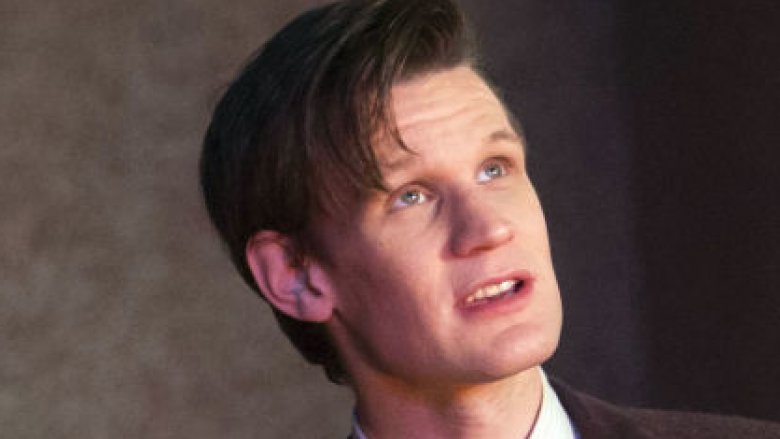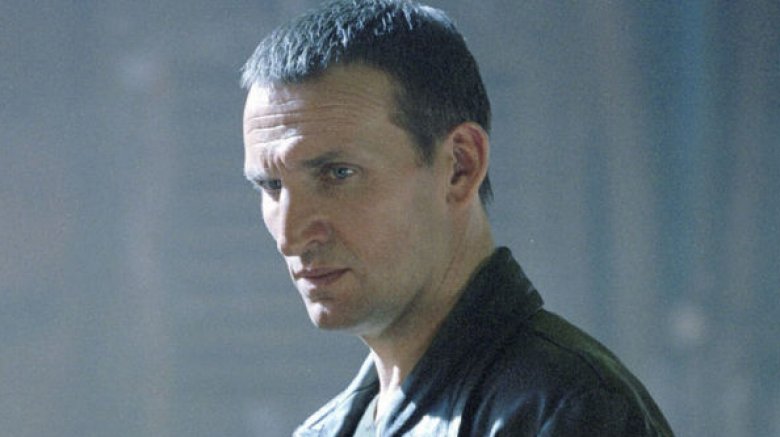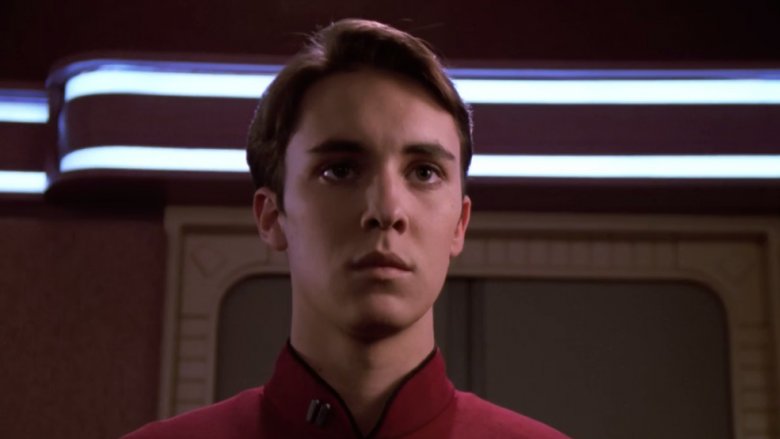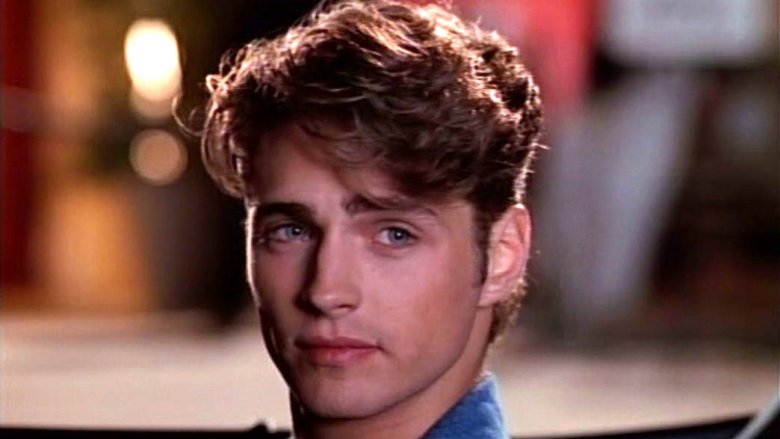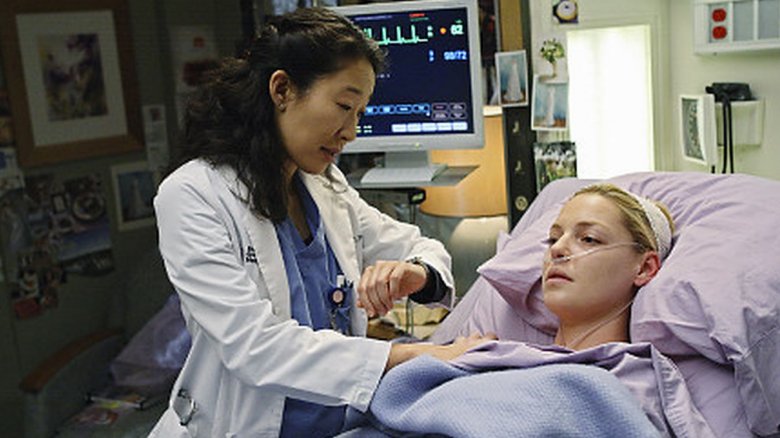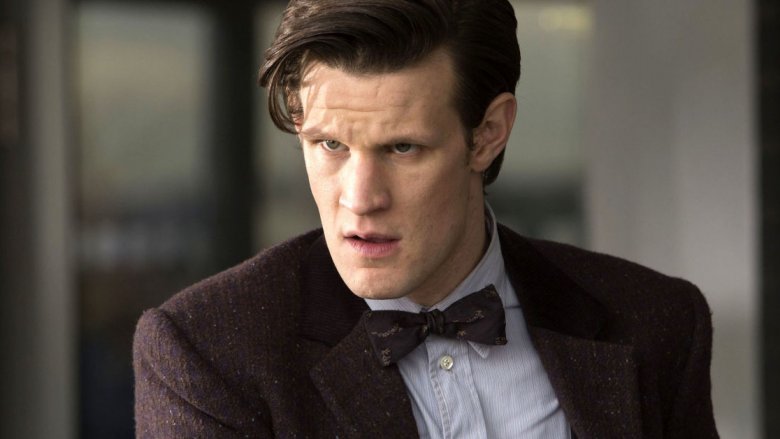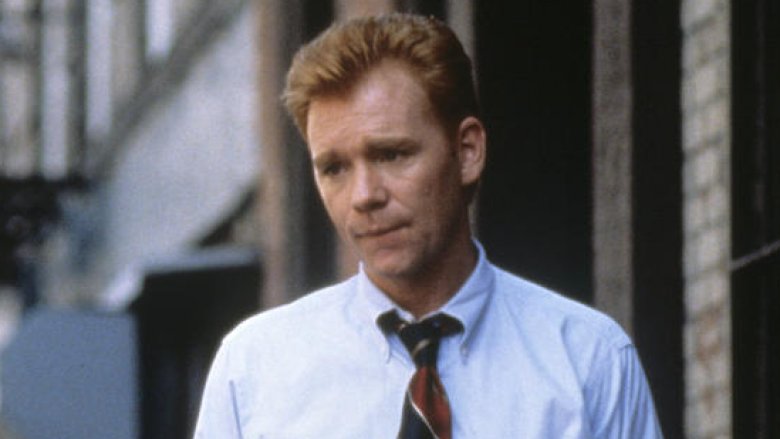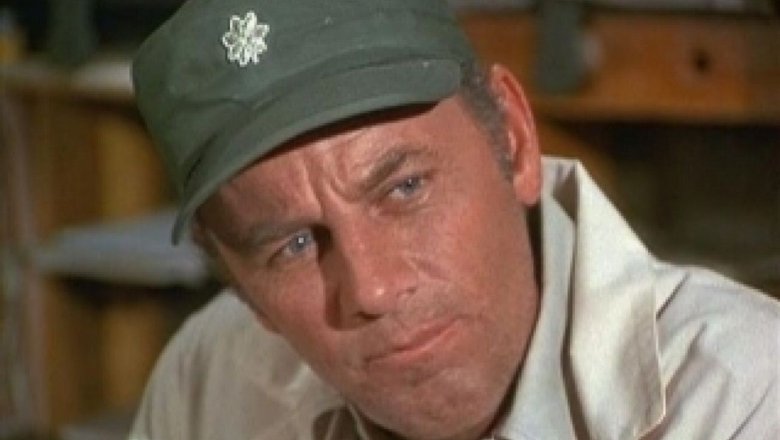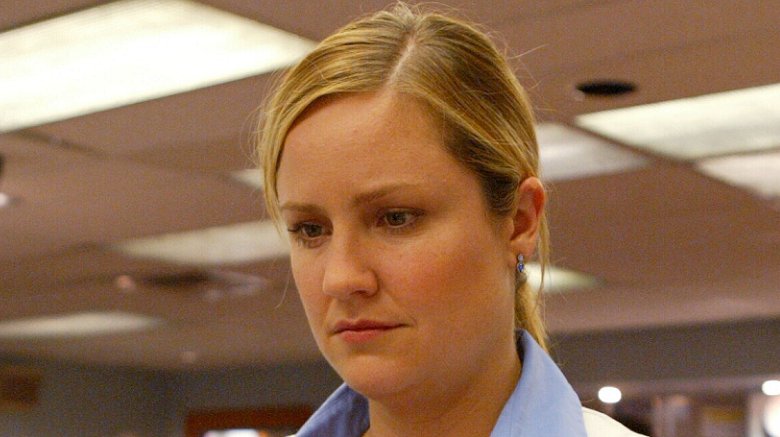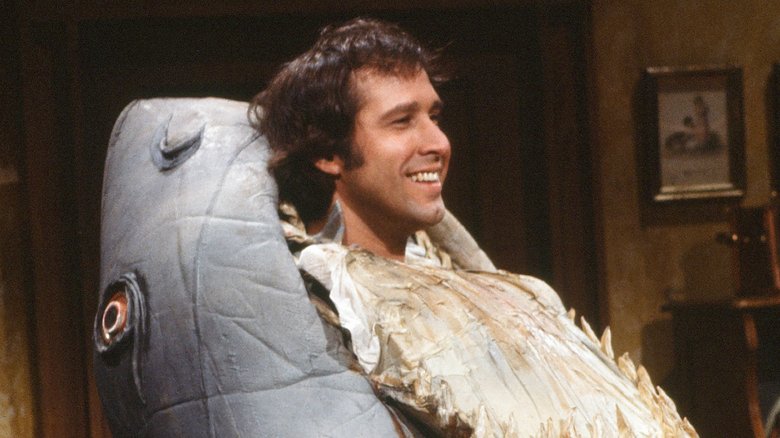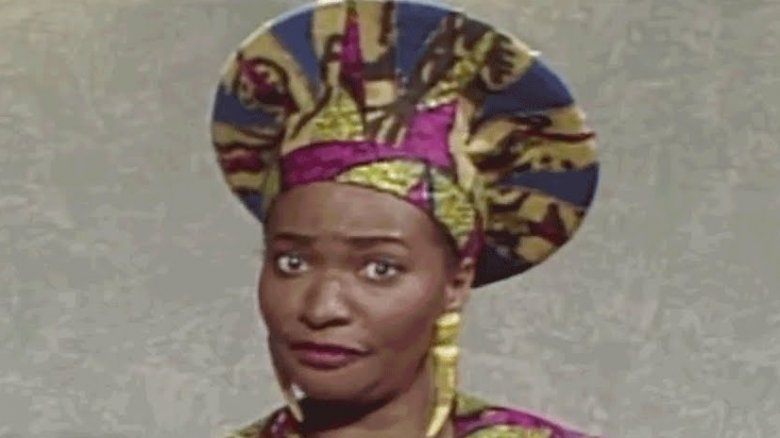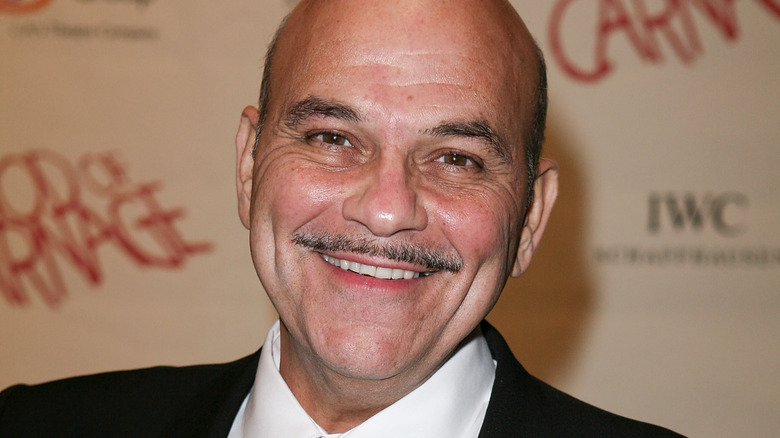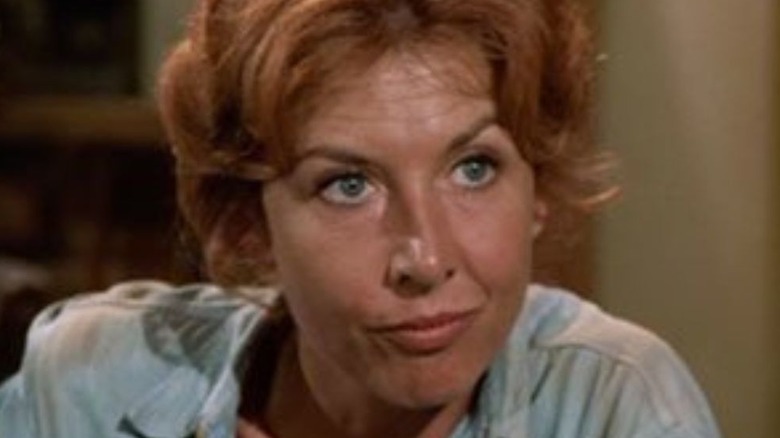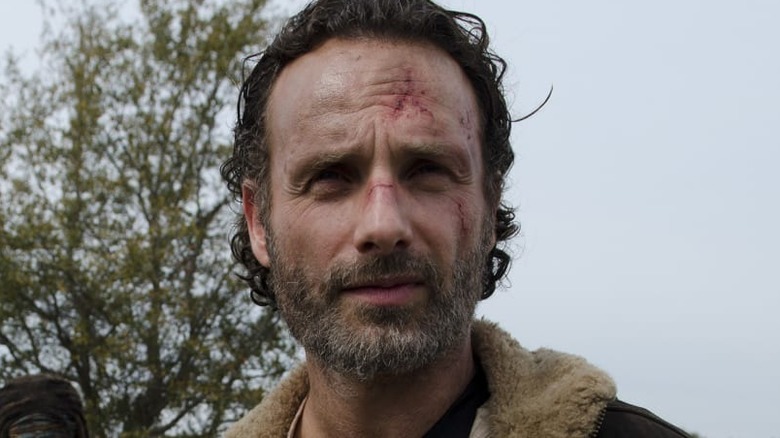Actors Who Regretted Quitting Hit TV Shows
Imagine being an actor, struggling for years to even get auditions, then landing a few gigs, and then getting cast on a major network television series that winds up becoming a huge hit with tens of millions of devoted fans who tune in every week. Now, imagine willingly walking away from all that. Why? Well, actors are complicated human beings, and they quit jobs for the same reasons non-actors quit their jobs that aren't TV shows — they get a better offer somewhere else (like another show, or wanting to do movies), or they're just plain bored with the job and want to try something new.
Performers leave their hit shows all the time, and results may vary. Usually they appear in other things and keep being famous, or maybe they get even more successful. Once in a while, they disappear and fade into obscurity. No matter their ultimate fate, actors may look around after their big, entertainment news-making decision and realize that they made a terrible mistake. Here are some people who left their TV series... and later wished that they hadn't.
'Who' knows why Christopher Eccleston left
Doctor Who's return to television in 2005 was rightfully met with much fanfare. No longer the low-budget, studio-filmed goof it had been during its 1963 to 1989 initial run on the BBC, it was now a cinematic action spectacular, headlined by English actor Christopher Eccleston as the ninth iteration of the TARDIS-using, time-and-space traversing time-traveler from the planet Gallifrey. But part of that excitement was dampened when Eccleston decided to leave the show after just 13 episodes. The reason for the quick split: creative differences with producers. "I wanted to do it my way, they wanted something else," Eccleston told The Daily Record in 2015. "We were never going to compromise so it was best to be straight about it and just go."
But maybe that wasn't as for the best as he thought. Eccleston told the Australian radio show Drive that he wishes he could have stayed on a bit longer. "He's a beautiful character and I have a great deal of professional pride and had I done a second season, there would have been a marked improvement in my performance," he reflected. "I was learning new skills, in terms of playing light comedy. I was not known for light comedy and, again, production did not allow for that."
There there's a Wil, there's a way out
Wil Wheaton scored two of the biggest and most impactful teen roles of the 1980s, back to back: Gordie Lachance in Stand by Me, and the young, sometimes cranky Ensign Wesley Crusher on Star Trek: The Next Generation. After four seasons on the show, Wheaton walked away from his job as a regular cast member in 1990, right around the time that he turned 18. (He did, however, return for the occasional guest spot until TNG ended in 1994.) It wasn't until 2012, during a Next Generation cast reunion onstage at the Calgary Comic and Entertainment Expo, that Wheaton let the world know just how embarrassed he was for his behavior after stepping off of the Enterprise.
"I was 18 years old and initially I thought it was a really smart business career move. In some ways it was and in more ways it wasn't. What I wasn't prepared for was how much I was going to miss the people on this stage," Wheaton said. He was so devoted to doing his "own thing" and forging his way in the world that he didn't see his co-stars for a while. "After that ended, I just felt really ashamed of myself. I felt like I couldn't look them in the eye and that I couldn't invite them to my wedding." After he crossed paths with his co-stars at fan conventions, he apologized and rekindled those friendships.
Beverly Hills, 9021-oh no
By the tenth and final season of the classic Fox high school soap, Beverly Hills, 90210 was no longer set in and around West Beverly Hills High School, detailing instead the adult-ish romantic, social, and professional lives of a bunch of SoCal friends. Many original cast members had long ago moved on, including Shannen Doherty, and Luke Perry. After Jason Priestley's character, budding journalist Brandon Walsh, takes a job at the Washington D.C. bureau of a New York newspaper, the actor — who starred as a lead in the show since the first season — made just five appearances in Season 9 and one cameo in Season 10. Evidently, Priestly was also ready to move on.
"I felt that the character of Brandon had kind of run his course," Priestley told CNN in 2014. But despite staying with the show for 90 percent of its extremely long run, Priestley second-guessed himself. "In retrospect, I do regret leaving," he added. He realized he should have trusted that his character's romantic arc, with Jennie Garth's Kelly Taylor, would get resolved. "Understanding what I do now about story and character, I believe that [writers] would have had Brandon and Kelly end up together at the end of the show and I think I probably should have stuck around to its fruition."
Katherine Heigl is still available
Grey's Anatomy made Katherine Heigl famous, but it's also where she earned a reputation for being "difficult." In 2008, she withdrew her name from consideration at that year's Emmy Awards, publicly stating that she "did not feel that I was given the material this season to warrant" a nomination. Eight years later, she explained on The Howard Stern Show that she meant she "didn't feel good about [her] performance," and didn't actually mean to shade the show's writers or creator Shonda Rhimes, to whom Heigl personally apologized. Nevertheless, she left the show in 2010 to spend more time with her family and pursue a burgeoning movie career. Writers killed off her character, Dr. Izzie Stevens.
Just two years later, Heigl wondered if her exit had been premature. When asked by Barbara Walters on a 2012 episode of The View if she regretted leaving Grey's Anatomy, Heigl said, "Oh yeah, sometimes, yeah. You miss it." But then Heigl really made her feelings known, not-too-subtly asking to come back to the show. "I always felt that if they wanted me to come back and sort of wrap up that storyline," Heigl said, "I want them to know that I'm down with it if they want me to."
Matt Smith would go back to Doctor's hours
Matt Smith portrayed the 11th iteration of the titular Time Lord on Doctor Who. All of 26 at the time, he was the youngest actor to ever play the part, and he brought an infectious, youthful energy to the role. It turned the previously little-known British TV actor into an international superstar who went on to an Emmy-nominated turn on The Crown (as Prince Philip).
For the bulk of his Who tenure from 2010-2013, he co-starred opposite fellow future big star Karen Gillan (Guardians of the Galaxy, Jumanji), who portrayed the Doctor's time-and-space-travel companion, Amy Pond. Gillian left the show before Smith did, and producers replaced her with Jenna Coleman as a new companion, Clara Oswald. The Doctor regenerated into a new form that looked just like actor Peter Capaldi after Smith shared the screen with Coleman in just 12 episodes, a number Smith later said wasn't enough. "That's one of my great regrets," Smith said at the 2016 New York Comic Con, "that I didn't get a full season with Jenna."
But if you believe Steven Moffat, Doctor Who's chief writer during Smith's tenure, it's not just his abbreviated run with Coleman that Smith laments. In 2016, Moffat said Smith wishes he'd never left at all. According to The Mirror, Moffat alleged that Smith has been "quite open about how much he misses it, and how much he wishes he hadn't left."
From NYPD Blue to Hollywood punchline
Intense actor David Caruso is certainly best known for his meme-inspiring performance as sunglasses-lowering crime inspector Horatio Caine on CSI: Miami. That pushed to the back of the collective consciousness the previous thing that made Caruso famous. In 1993, he vaulted from obscure character actor to TV superstar with a role on the gritty smash hit police drama NYPD Blue. Caruso received an Emmy nomination and a Golden Globe win for his role as Detective John Kelly... but he still left the hugely popular show after just one season. Caruso thought he could make it in his movies, and it didn't quite happen. His 1995 crime thrillers Kiss of Death and Jade both flopped at the box office, after which Caruso didn't book a gig for two years, then starred in a couple of forgettable movies and the quickly canceled CBS drama Michael Hayes. The actor finally returned to prominence when CSI: Miami debuted in 2002.
That long crawl back taught Caruso a thing or two. "I've been pretty upfront about admitting I messed up on a great opportunity," he told the Sioux City Journal, attributing his NYPD Blue departure to not knowing what he was doing. "I didn't understand what the priority of the day is about."
Hello, Larry, Goodbye, McLean
Before David Caruso's career implosion, the TV star most associated with career self-destruction might have been McLean Stevenson. Fans loved the actor in his supporting role on M*A*S*H as laid-back Colonel Henry Blake. But in 1975, after three seasons on the show, Stevenson got an itch to do something more... and bigger. According to M*A*S*H writer Ken Levine, Stevenson received many offers during that time to star on his own show, and so, after fulfilling his three-season contract, he left. Writers killed off his character, which just wasn't widely done in the 1970s; while en route to his home back in the U.S., Col. Blake's plane was shot down.
Stevenson then had to endure another "death" — that of his television career. After M*A*S*H, he starred in one high-profile, quickly canceled flop after another: The McLean Stevenson Show; In the Beginning; Hello, Larry; Condo; and the TV version of Dirty Dancing. In 1990, after that streak's merciful end, Stevenson reflected on his TV career for the Baltimore Sun. "I made the mistake of believing that people were enamored of McLean Stevenson when the person they were enamored of was Henry Blake," Stevenson said. Looking back on the series that started it all for him, he lamented, "I've never been able to work with a group that's as talented or scripts that are as good."
An emergency return for Sherry Stringfield
It's basic math: The longer a show runs, and the larger its ensemble, cast departures grow in likelihood. Take ER, for example, which slowly shed all six of its original cast members. Anthony Edwards left after season 8, while George Clooney disappeared after season 5, only to make a special appearance in season 6. And then there's Sherry Stringfield. She left ER early in its run... and then came back as a full-fledged cast member a few years down the line. Why? She missed it just that much.
From 1994 to 1996, Stringfield portrayed emergency physician Susan Lewis on the hit NBC medical drama. She worked sporadically over the next few years, but in 2001, she had a baby, which made her long for and appreciate the time management that comes with shooting a weekly television show. "I was really starting to crave a schedule," she told the Chicago Tribune. And rather than try to get cast in a new series, she returned to where she was most comfortable: ER. She asked executive producer John Wells if she could come back, and he said sure. "That was it. Then I moved, read the first script, and showed up for work. It was really that easy."
He's Chevy Chase, and he feels bad
As Saturday Night Live revolutionized TV with its first season in 1975-'76, many of the original cast of "Not Ready for Prime-Time Players" became overnight stars, particularly Chevy Chase. After all, he was the one who played President Gerald Ford as a pathologically bumbling human pratfall and hosted "Weekend Update," where he coined the catchphrase, "I'm Chevy Chase, and you're not." Like many SNL stars after him — Eddie Murphy, Will Ferrell, Kristen Wiig — Chase left the show to pursue a film career, which proved successful with movies like Caddyshack and the Vacation series. Unlike those successors, Chase left the show ridiculously fast — he exited SNL after about a year.
During the SNL 40th anniversary festivities in 2015, Chase told Carson Daly that he "left after the first year because I thought this isn't going anywhere." (Wrong.) "But I missed it more for not being a part of the cast because I left after one year. I had reasons to leave."
Come back, Ellen Cleghorne
Ellen Cleghorne was an extremely talented part of the extremely overloaded Saturday Night Live cast of the early 1990s. She had to compete for precious airtime each week with the likes of Chris Farley, Phil Hartman, Dana Carvey, David Spade, and Adam Sandler, among others. Nevertheless, she told VH1 that others advocated for her, particularly Sandler and writer and performer, Al Franken, who taught her how to write sketches. During her time on the show, she developed two recurring characters, Queen Shenequa and Zoraida the NBC Page, and impersonated newsmakers such as Surgeon General Joycelyn Elders, Anita Hill, and Toni Morrison.
In 1995, right around the same time that SNL boss Lorne Michaels fired several cast members in favor of new blood, Cleghorne quit the show. The reason: The WB picked up her sitcom, Cleghorne!, to series. That show, a starring vehicle, was ultimately canceled after just one low-rated season, and Cleghorne still has mixed feelings about her SNL departure. "I mean I wish I would have stayed at Saturday Night Live," she said. "It was important at the time, for me but I did miss being on SNL."
Jon Polito objected to a casting change on Homicide
NBC's bleak police drama, "Homicide: Life on the Street," which ran from 1993 to 1999, initially co-starred Jon Polito as a troubled detective, Steven Crosetti. At the end of Season 2, Crosetti takes an indefinite vacation, and he disappears until an early Season 3 episode when his body surfaces in the waters bordering Baltimore. Based on earlier peculiar behavior and the presence of alcohol and antidepressants in his system, the death is ruled as a suicide.
By 1994, "Homicide" was struggling in the ratings, and NBC stepped in with suggestions on how to attract more viewers. Executive producer Tom Fontana agreed to bring in a female cast member and cut a male actor. He decided to fire Polito and then bring him back when the show wasn't under such intense network scrutiny. Polito didn't buy the story. "I didn't believe that because I'd been screwed by so many producers over the years," he later told Groucho Reviews. Polito publicly complained about his firing to the press, likening Fontana and producer Barry Levinson to the iceberg that took down the Titanic.
After all of that, "Homicide" writers killed Detective Crosetti, preventing any kind of easy or promised return for Polito. "I was wrong to jump at Fontana and all that, and not believe in Fontana and Levinson, because they're great people and would've been faithful to me." Polito returned to the 2000 wrap-up, "Homicide: The Movie," as a ghost.
Michael Learned just couldn't do The Waltons anymore
Michael Learned was a little-known, up-and-coming actor with a handful of episodic TV credits to her name when she took on the role of Depression-era rural matriarch, Olivia Walton, in "The Waltons" in 1972, taking over for Patricia Neal, who originated the role in the TV movie that inspired the series. The show made Learned a major small-screen star, and it won her three Emmy Awards against six nominations. The other breakout star of "The Waltons" was Richard Thomas, who portrayed John-Boy Walton, until he left the show in 1978. Producers recast the role with actor Robert Wightman.
Thomas's departure ultimately presaged Learned's exit, too. "When John-Boy came back with a new face and a new voice, it was like something happened, I just couldn't do it anymore," Learned told Fox News. "Also, I felt a lot of the times I was sitting around for 14 hours saying, 'More coffee John.' The fact is, I was bored." Learned left "The Waltons" in 1979, and Olivia's exit was chalked up to recuperation from tuberculosis in a distant medical facility. "The Waltons" would only run two more seasons without Learned, and looking back, she figures she should've just stuck it out. "There's been times when I've regretted it only in that it probably would have been better to complete the whole show," Learned said.
Andrew Lincoln walked away too fast from The Walking Dead
Andrew Lincoln was the original cast member of "The Walking Dead." When the AMC zombie drama began in 2010, the first episode found his character, small-town police sheriff Rick Grimes, awakening from a coma to discover a post-zombie apocalypse wasteland. Lincoln stayed with the show before deciding to move on during Season 9. In a 2018 episode, Rick disappears after a bridge explosion, presumed dead to the rest of the show's main characters. He was actually hauled away in a helicopter belonging to the Civic Republic Military.
At the time, producers of "The Walking Dead" explained the subsequent absence of both Rick and Lincoln with the promise of standalone movies concerning the further adventures of Rick Grimes. Those never came to fruition, canceled in favor of a limited series about the post-apocalyptic adventures of Rick and his once-and-future partner, Michonne (Dana Gurira).
Lincoln returned to "The Walking Dead" proper just once, and briefly, in the 2022 series finale. That was perhaps telegraphed by co-star Norman Reedus (Daryl). While promoting the Season 9 finale in March 2019, the actor shared that Lincoln had some regrets about departing "The Walking Dead" when it was hitting its stride. "I talked to Andy the other day, and he was like, 'Man, I picked the wrong time to leave the show because it's so f***ing good right now,'" Reedus told Entertainment Weekly "I'm like, 'Yeah, you did, dude.'"
